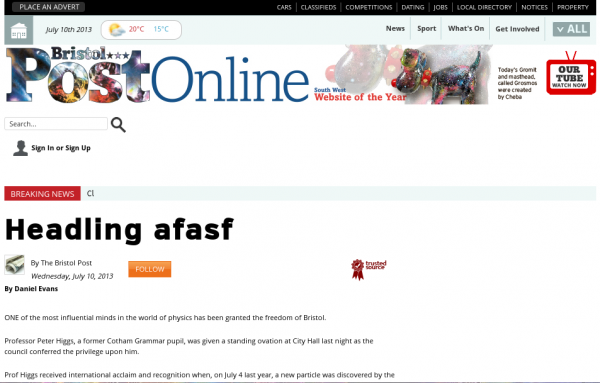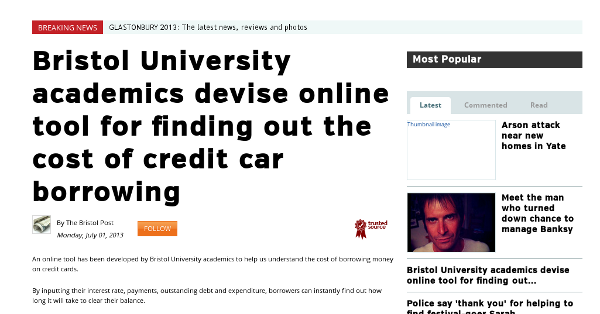Bristol Post Balls 3 – everyday sexism
The Bristol Post’s gaffes are not restricted to its website and dead tree version.
Yesterday its Twitter feed yielded the following bit of everyday sexism (and no apology when challenged. Ed.).

The Bristol Post’s gaffes are not restricted to its website and dead tree version.
Yesterday its Twitter feed yielded the following bit of everyday sexism (and no apology when challenged. Ed.).

Below is a screenshot of the story in today’s Bristol Post reporting on Professor Peter Higgs – one of the team that postulated the existence of the particle named after him back in the 1960s – being granted the freedom of the city of Bristol.

Professor Higgs is a former pupil of Bristol’s Cotham Grammar School.
For a local media report of the event that has a proper headline, I recommend Bristol 24/7’s offering.
Bristol & Avon Family History Society has some interest background information on the history of the Freedom of Bristol and Burgesses, as Freemen (and they were men in medieval times. Ed.) were originally known.
Spot the typographical error in the headline below from today’s online edition of the Bristol Post.

The phrase “to spend a penny”, meaning to use a public lavatory, has its origins in the use of coin-operated locks on public toilets in the UK. When these were first introduced, the fee for use was normally one penny (1d); and it stayed at that level for decades, well into the second half of the twentieth century.
However, the cost of being caught short and having to use a public lavatory has undergone a massive inflationary rise if a report in today’s Bristol Post is to be believed.

Pictured above is an old English bank note with a face value of 10 shillings; that’s equivalent to 240 pence.
The Bristol Post report states that people could be charged up to 50p (that’s ten shillings in old money. Ed.) to spend a penny in a new block of town centre toilets in Portishead, which could cost up to £40,000 to build.
The Post quotes Portishead Town Council Clerk Jo Duffy as follows on the likely cost of spending a penny:
There would be a charge levied for using the toilets, which could be up to 50 pence per visit. However the town council is keen to keep the charge at a lower level of around 20 pence if possible.
Even 20 pence for a pee is extortionate, in my opinion.
This blog has covered the peculiarities of life in North Somerset before now (posts passim) and at least one person leaving a comment on the Post report feels relieved he’s not a resident:
Every day I wake up and thank the Lord that I don’t live in North Somerset.
This blog has written before about politicians’ scrapes with technology and their apparent inability to cope with it (posts passim).
Below is a screenshot of a tweet (since deleted) by Andrew Selous, the Tory MP for South West Bedfordshire commenting on Chancellor of the Exchequer Gideon Osborne’s comprehensive spending review in the House of Commons earlier today.

Andrew should also know that the first rule about criticising others’ use of language is to make sure one’s own is impeccable (but they probably omitted to teach him that at Eton. Ed.).
Hat tip: Phil Gibson.

The prayer is reproduced below for those you have yet to come across it. I hope you enjoy it.
Our father, who art in /sbin,
init is thy name.
Thy PID is 1;
Thy children run
In user space as they do in kernel.
Give us this day our daily RAM
And forgive us our interrupts
As we are nice to those who interrupt us.
Lead us not into uncaught exception
And deliver us from SIGKILL
For thine is the system
And thou art the saviour
For ever and ever – until we upgrade yer!
In addition, Andreas Pothe has translated Naomi’s original prayer into German:
Vater Unser, der Du da bist in /sbin,
init ist Dein Name.
Deine PID ist 1,
Deine Kinder laufen
Im Benutzermodus wie auch im Kernel.
Unser tägliches RAM gib uns heute
Und vergib uns unsere Unterbrechungen
Wie auch wir vergeben unseren Unterbrechern.
Und führe uns nicht in unbehandelte Ausnahmen
Und erlöse uns von dem SIGKILL
Denn Dein ist das System
Und die Kraft und die Herrlichkeit
In Ewigkeit – Bis wir Dich updaten!
Sean Benyon, Labour councillor for Bristol’s Southville ward, has either bought fellow councillor Gus Hoyt’s old mobile phone (posts passim) or has fallen into the same predictive text trap as his Green colleague down the Counts Louse.
The tweet is depicted below. You decide. 😉

Since that unfortunate incident, Sean has announced he’s buying a new phone. Turning off predictive text is cheaper, Sean. 🙂

His lack of legal training could explain lots: he’s been brought in to do a hatchet job on the justice and legal system; some of the changes he’s planning to implement would never be contemplated for an instant by lawyers.
Whilst in opposition, Grayling became known as a national politician through his “attack dog” pressure on leading Labour politicians.
It would appear that Grayling is still on the attack if an interview in the Law Society Gazette earlier this week is examined.
Grayling seems completely unworried about removing the right of the accused to pick an advocate of his/her choice under the criminal legal system. Indeed, he’s positively contemptuous of those that end up in the dock!
‘I don’t believe that most people who find themselves in our criminal justice system are great connoisseurs of legal skills. We know the people in our prisons and who come into our courts often come from the most difficult and challenged backgrounds.
Yes, you did read that correctly. If you need to rely on legal representation funded by criminal legal aid, Grayling thinks you’re too thick to pick your own lawyer, so why not let the state pick one for you. Furthermore, by lumping together people who find themselves in the criminal justice system with those in prison, Grayling arrogantly seems to be equating being in the dock automatically with being guilty. What happened to the presumption of innocence, Mr Grayling?
However, Grayling’s contempt and abuse is not confined solely to those unfortunates in the dock. Several times in the interview he refers to the provision of legal services as an ‘industry’.
When I did economics 4 decades ago, the economy consisted of 3 sectors: primary (e.g. agriculture, mining), secondary (e.g. manufacturing, industry) and tertiary (e.g banking, insurance, legal services).
By referring to the ‘legal services industry’ Grayling has moved legal services from the tertiary to the secondary sector. In so doing he has reduced the role of the skilled legal professional to that of a mere machine operative and that of their clients to the widgets that the machine produces. Grayling is thus guilty of treating people as objects, which is not just a retrograde step for justice, but for British society as a whole.
The Western Gazette really knows how to write an attention-grabbing headline.

The only thing I would have added to that headline is an additional word at the start. Exclusive! 😉
Hat tip: Laura Williams
The front page of today’s Bristol Post.

Meanwhile over at BBC Bristol, their headline for the story reads ‘Keynsham stand-off: Police shoot suspect in wheelchair’.